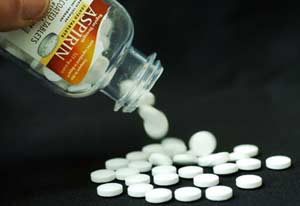In elderly individuals, the daily use of aspirin doubles the risk of myocardial infarction. Children, asthma patients, and those with gastric ulcers should not use this medication.
 |
|
Aspirin Medication (Photo: news.harvard) |
Aspirin’s active ingredient is found in many common drug formulations. In addition to its pain-relieving, anti-inflammatory, and fever-reducing effects, over the last 20 years, various new benefits of aspirin have been discovered, including its ability to prevent strokes caused by cerebral vascular obstruction, treat heart attacks, myocardial infarctions, and manage cardiovascular complications in diabetic patients.
The reason aspirin is effective in treating cardiovascular diseases is its ability to inhibit blood clot formation. This function allows aspirin to thin the blood. Research in the United States indicates that aspirin reduces the incidence of mild heart attacks in individuals with a low risk of cardiovascular disease. However, the mortality rate among the study group and the control group was identical. Scientists argue that even if aspirin’s heart attack prevention effects are real, it may increase mortality rates due to other diseases or complications.
Many studies show that aspirin protects brain cells, reduces memory loss in the elderly, and decreases the risk of strokes. However, some other studies show opposite results: increased risk of strokes, cerebral hemorrhages, brain cell damage, seizures, and age-related macular degeneration. A study conducted in Japan at the end of 2005 confirmed that aspirin not only fails to prevent strokes in patients with arrhythmia but also increases their bleeding risk.
Adverse Effects of Aspirin
One common complication of aspirin is gastrointestinal damage, including gastric ulcers and gastrointestinal bleeding. About 2-6% of users have to discontinue the medication due to these symptoms. The higher the dosage and the older the patient, the greater the likelihood of gastrointestinal complications. Aspirin’s anticoagulant properties also increase the risk of cerebral hemorrhage, with a rate of about 2% among users.
In elderly individuals, daily aspirin use doubles the risk of myocardial infarction. Aspirin also increases cases of hemorrhage, renal cancer, and colon cancer, offering no protective benefits for either hypertensive or hypotensive patients.
Patients at low risk for coronary artery disease gain no benefits from aspirin and instead face an increased likelihood of drug-related complications.
Some individuals may experience allergies to aspirin, resulting in rashes, hives, and swelling around the eyes. Aspirin can also trigger a type of asthma known as aspirin-induced asthma. Patients with bronchial asthma and nasal polyps should avoid aspirin, as it can provoke severe asthma attacks.
In children, aspirin can lead to Reye’s syndrome, a rare but dangerous condition. This syndrome often occurs when children take aspirin for influenza, chickenpox, or other viral respiratory infections. Initial symptoms include vomiting, drowsiness, and can progress to coma and respiratory paralysis. Severe cases may result in liver degeneration and death due to cerebral edema.
American scientists have also indicated that aspirin and common anti-inflammatory pain relievers may increase the risk of miscarriage when used during pregnancy, particularly in the early stages.
How to Use Aspirin Safely
Based on current research and knowledge, aspirin should only be used according to its standard indications for treating illnesses and symptoms as needed. It should not be used by individuals with a history of bleeding disorders, gastric ulcers, those sensitive to aspirin, or those with liver and kidney diseases.
Aspirin formulations with enteric coatings or neutral aspirin do not actually reduce the incidence of gastrointestinal complications. Drinking alcohol in any amount increases the risk of aspirin-induced bleeding.
When used with other anti-inflammatory pain medications such as ibuprofen, the gastrointestinal risks of aspirin can be amplified. Its bleeding risk also increases when combined with anticoagulants. Herbal medicines that promote blood circulation, such as Panax notoginseng, Chinese angelica, and safflower, should also be used cautiously with aspirin.
A concerning fact is that in many patients, bleeding symptoms can occur silently without warning signs. The following symptoms may signal caution: black stools or blood in the stool, vomiting blood, severe abdominal pain due to acute bleeding, and anemia from prolonged, unnoticed bleeding.
Dr. Hoang Xuan Ba


















































